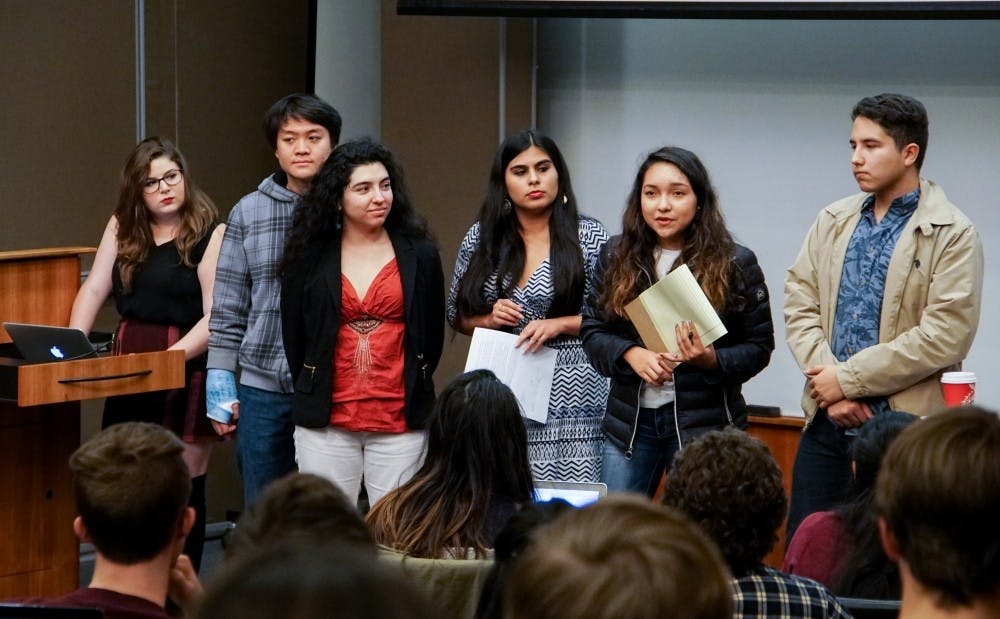In a message to the Duke community Thursday afternoon, President Richard Brodhead expressed the University's support for undocumented students, but also noted that the concept of a sanctuary campus has no legal basis.
In his email, Brodhead acknowledged that there has been concern about the future of undocumented college students after Republican Donald Trump—who has taken a hardline on immigration—won the 2016 presidential election. Last month, Brodhead signed a letter expressing support for the Deferred Action for Childhood Arrivals program, which allows undocumented immigrants who entered the country as immigrants to avoid deportation. He also pointed to the University's recent decision to admit undocumented students on a need-blind basis and to make them eligible for financial aid if they are not permitted to work on campus.
"We are committed to ensuring that our campus is a place where all students can focus on what brought them to Duke: to get a world-class education in an environment that supports them," he wrote.
Brodhead also noted that the Office of Student Affairs is offering private discussion sessions with potentially students, and that the University's Office of Government Relations has reached out to members of Congress. At the same time, however, he indicated that Duke would not be able to become a sanctuary campus as several students have requested.
Duke Student Government passed a resolution Wednesday urging the administration to become a sanctuary campus, arguing that Duke has the power to "withhold undocumented students’ information from immigration officials without a subpoena" and "[prevent Immigration and Customs Enforcements] agents from entering campus without a warrant."
Although Brodhead commended the DSG resolution, he also wrote that the "term has no basis in the law" and cannot confer any additional protections not already in place.
"No university in America can declare itself immune from the rule of law," he wrote. "However, university campuses are governed by their own communal values and offer the protection of those values to those who live in them. Duke University values its students no matter their background or immigration status, and historical moments like this one offer an opportunity to clarify that commitment."
The #DukeSanctuary group wrote in a statement that they appreciated Brodhead's email and said it addressed their concerns. The statement also noted that the group looks forward to working with administration to implement programs supporting undocumented students and members of the Durham community.
Deborah Weissman, Reef C. Ivey II Distinguished Professor of Law at the University of North Carolina, agreed that universities must comply with warrants. She also emphasized that although the upcoming Trump administration might be unpredictable, Immigration and Customs Enforcement has never before come onto campuses.
"I would not want to be the person who suggests we have nothing to worry about because there's plenty to worry about, but I think we also have to gauge the level of risk. I don't think that ICE coming onto campus is something that there's any precedent for or that we are likely to see," she said.
However, she noted that the students' sanctuary demand is more about recognition, solidarity and efforts to make campus free of racism and xenophobia.
Weissman said she thought it was technically possible for the new administration to rescind research funding from universities that declare themselves "sanctuaries" but said that possibility should not be the deciding factor.
"I don't think that a university which would enact sanctuary in the way I'm describing should be afraid of that because then you are just going to sell your soul," she said. "And if you're not willing to stand up and demand respect and physical integrity and no bullying and no racial taunting and educating the deep and historic problems with immigration reform and stand up for a more civilized society, then your grants are not of any use."
The push for sanctuary campuses has spread to colleges across the country and has been met with a variety of responses. At the University of Pennsylvania—where incoming President Vincent Price is provost—the school declared itself a "sanctuary" but did not use the term "sanctuary campus." Columbia University similarly declared itself a sanctuary for its undocumented students. Swarthmore College took the added step of refusing to participate in the E-Verify system, a government program that determines whether employees are legally eligible to work in the United States. North Carolina requires employers with 25 or more employees to use the E-Verify system for new hires.
North Carolina law also prevents municipalities, such as the City of Durham, from establishing policies that would give them technical "sanctuary" status for undocumented immigrants. Still, a General Order from the Durham Police Department states the primary responsibility of officers is to handle criminal matters and that immigration enforcement rests primarily with the Department of Homeland Security.
Editor's Note: This article was updated to include comments from Weissman, the #DukeSanctuary group and provide additional context about other universities.
Get The Chronicle straight to your inbox
Sign up for our weekly newsletter. Cancel at any time.
Adam Beyer is a senior public policy major and is The Chronicle's Digital Strategy Team director.

